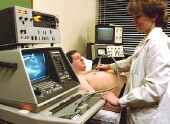
TUESDAY, July 19 (HealthDay News) — Married men or those in common-law relationships seek medical care for heart attacks sooner than men who are single, divorced or widowed, according to a new study by Canadian researchers.
The researchers contend that by receiving medical care sooner, married men are more likely to survive a heart attack than men who are single. The study’s findings could help inform the public about why prompt treatment following signs of a heart attack is critical.
In conducting the study, published July 18 in the Canadian Medical Association Journal, the researchers analyzed cases of 4,403 people in Ontario averaging 67 years old who had had heart attacks. Two-thirds of those studied were men. The researchers found that 46 percent of all participants went to the hospital within two hours, and 74 percent arrived within six hours.
More specifically, among married people, 75 percent went to a hospital within six hours of first chest pain, compared with 68 percent of single, 68 percent divorced and 71 percent of widowed patients.
“At the patient level, among patients with an exact time of onset of chest pain, the adjusted time saved was a remarkable half-hour. Among all the factors that had an effect in the primary outcome model, only calling an ambulance had a greater influence on the time to presentation,” said Dr. Clare Atzema, of the Institute for Clinical Evaluative Sciences in Toronto, and her colleagues in a CMAJ news release. “Because cardiovascular disease is the most frequent cause of death in Canada and the Western world, the benefit at the population level is substantial.”
The researchers noted, however, that, unlike their male counterparts, women who were married or in common-law relationships did not seek treatment any faster than single women. Women’s role as primary caregiver might help explain this discrepancy, the researchers concluded.
“Earlier attainment of medical care may be one reason why married men have a lower risk of cardiovascular mortality than their single counterparts,” said the study’s authors. “Awareness of the differences in reasons for delay by sex could facilitate the development of targeted public health campaigns as a way to reduce patient-caused delay among those at risk.”
More information
The U.S. National Institutes of Health has more on treatments for heart attack.

